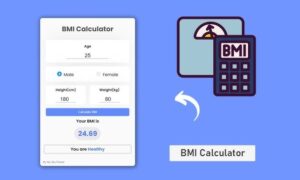Understanding your body mass index (BMI) is a crucial step in maintaining good health and well-being. The NHS BMI calculator provides a reliable, medically approved method to assess whether your weight falls within a healthy range for your height. This comprehensive guide will walk you through everything you need to know about using the NHS BMI calculator effectively and interpreting your results accurately.
What is BMI and Why It Matters
Body Mass Index (BMI) is a simple calculation that uses your height and weight to determine whether you’re at a healthy weight for your height. Developed as a screening tool, BMI helps healthcare professionals and individuals identify potential weight-related health risks.
The NHS BMI calculator is particularly important because it follows official medical guidelines established by the National Health Service. Unlike generic online calculators, the NHS BMI tool incorporates specific considerations for the UK population and aligns with current medical recommendations.
BMI matters because it serves as an early indicator of potential health issues. Research consistently shows that maintaining a healthy BMI can reduce your risk of developing severe conditions, including:
- Type 2 diabetes
- Heart disease and stroke
- High blood pressure
- Sleep apnea
- Certain types of cancer
- Osteoarthritis
While BMI isn’t a perfect measure of health for everyone, it provides a valuable starting point for discussing weight management with healthcare professionals.
How the NHS BMI Calculator Works
The NHS BMI calculator uses a straightforward mathematical formula: BMI = weight (kg) ÷ height (m)². However, the NHS version goes beyond simple calculation by incorporating additional factors that generic calculators might miss.
The NHS BMI calculator takes into account:
Age considerations: While the basic BMI categories remain the same for adults, the NHS tool provides age-appropriate guidance and recommendations recognizing how healthy weight ranges can vary slightly as we age.
Ethnicity factors: The NHS acknowledges that different ethnic groups may have varying health risks at different BMI levels. South Asian, Chinese, and other ethnic minorities may face increased health risks at lower BMI levels than the general population.
Medical context: The NHS calculator emphasizes that BMI is just one tool among many for assessing health, encouraging users to consider their results alongside other health indicators and professional medical advice.
If necessary, the calculation process involves converting your measurements into metric units and applying the standard BMI formula while considering these additional contextual factors that make the NHS approach more comprehensive than basic calculators.
How to Use the Tool
The NHS BMI calculator is straightforward, but accuracy is essential for meaningful results. Here’s your step-by-step guide:
Step 1: Gather accurate measurements. Weigh yourself in the morning using a reliable scale, preferably without clothes. Record your weight to the nearest half-pound or quarter-kilogram. Measure your height without shoes, standing straight against a wall, and record to the nearest centimeter or half-inch.
Step 2: Access the calculator. Use the official BMI Calculator NHS tool to ensure you get NHS-approved calculations and guidance.
Step 3: Input your information. Enter your height and weight using the units you’re comfortable with. The calculator will handle conversions automatically. Some versions may ask for additional information like age or ethnicity to provide more personalized guidance.
Step 4: Review your results. Your BMI will be calculated instantly, along with an explanation of your result’s category and what this means for your health.
Step 5: Consider the context. Remember that BMI is a screening tool, not a diagnostic tool. The NHS calculator will remind you to consider your health and consult healthcare professionals when needed.
Interpreting Results (Underweight, Healthy, Overweight, Obese)
Understanding your BMI results is crucial for making informed health decisions. The NHS uses specific BMI ranges that align with World Health Organization guidelines:
Underweight (BMI below 18.5) If your BMI falls in this range, you may be underweight for your height. This could indicate insufficient nutrition or underlying health issues. The NHS recommends consulting with a healthcare professional to determine if weight gain would benefit your health and to rule out any medical causes.
Healthy Weight (BMI 18.5-24.9) This range indicates that your weight is appropriate for your height and is associated with the lowest risk of weight-related health problems. However, the NHS emphasizes that being within this range doesn’t guarantee good health – other factors like fitness level, diet quality, and lifestyle habits remain essential.
Overweight (BMI 25-29.9) A BMI in this range suggests you carry excess weight that could impact your health. The NHS recommends focusing on gradual, sustainable weight loss through improved diet and increased physical activity. Even a modest 5-10% weight loss can provide significant health benefits.
Obese (BMI 30 and above) The NHS further subdivides obesity into three classes:
- Class I (BMI 30-34.9): Moderate obesity
- Class II (BMI 35-39.9): Severe obesity
- Class III (BMI 40+): Very severe obesity
Higher BMI levels are associated with increased risks of severe health conditions. The NHS strongly recommends seeking professional medical advice for weight management strategies, which might include lifestyle changes, medical interventions, or, in some cases, surgical options.
NHS Guidelines on Healthy Weight
The NHS provides comprehensive guidance on maintaining a healthy weight that goes beyond simple BMI calculations. Their approach emphasizes sustainable lifestyle changes rather than quick fixes or extreme measures.
Dietary Recommendations The NHS promotes a balanced diet rich in fruits, vegetables, whole grains, lean proteins, and healthy fats. Their guidelines suggest limiting processed foods, sugary drinks, and excessive portions while encouraging mindful eating practices.
Physical Activity Standards Adults should aim for at least 150 minutes of moderate-intensity aerobic activity per week, plus muscle-strengthening activities on two or more days per week. The NHS emphasizes that any movement is better than none and encourages people to find activities they enjoy.
Behavioral Strategies The NHS recognizes that sustainable weight management requires addressing psychological and behavioral factors. They recommend setting realistic goals, tracking progress, building support systems, and developing healthy coping strategies for stress and emotional eating.
Medical Support For individuals whose BMI levels indicate health risks, the NHS provides various levels of support, including referrals to dietitians, weight management programs, and specialized medical interventions when appropriate.
The NHS approach emphasizes that healthy weight management is a long-term commitment requiring patience, consistency, and often professional support. They discourage crash diets or extreme measures that may provide short-term results but fail to establish lasting healthy habits.
Start Calculating Your BMI Now
Understanding your current BMI status is the first step toward better health awareness. The NHS BMI calculator provides the most reliable, medically sound assessment available to UK residents and anyone seeking NHS-standard health guidance.
Regular BMI monitoring can help you track changes over time and make informed decisions about your health. However, remember that BMI is most valuable when used as part of a comprehensive approach to health that includes regular medical check-ups, attention to overall fitness, and consideration of individual health factors.
Don’t let uncertainty about your health status prevent you from taking positive action. Whether your results show you’re in a healthy range or indicate areas for improvement, knowing your BMI provides valuable information for making informed health decisions.
The NHS BMI calculator is free, quick to use, and provides immediate results with clear explanations. Combined with professional medical advice when needed, it is an excellent starting point for anyone committed to maintaining or improving their health.
Take control of your health journey today by calculating your BMI and using the results to make informed decisions about your well-being. Remember, every step toward better health is worth taking, regardless of where you start.



































